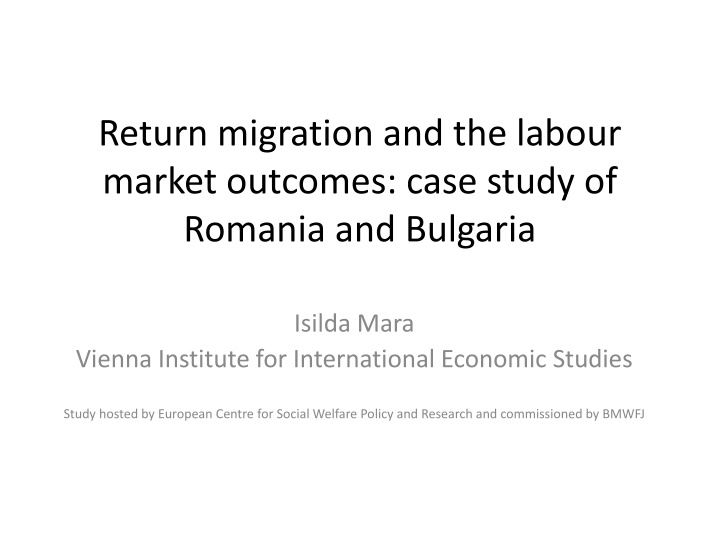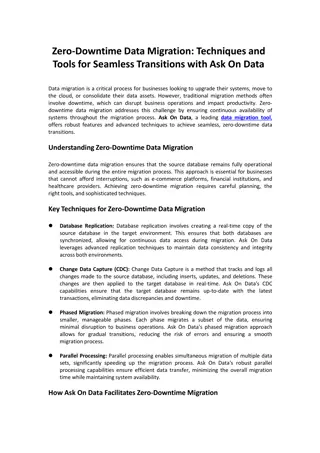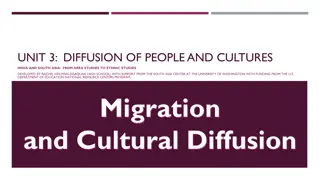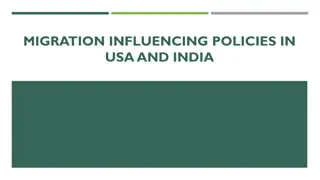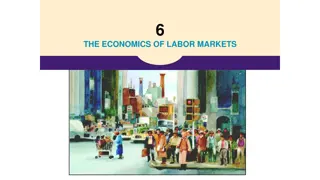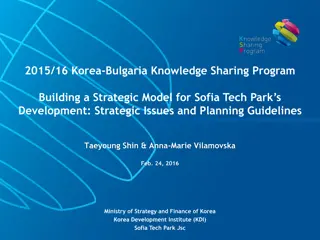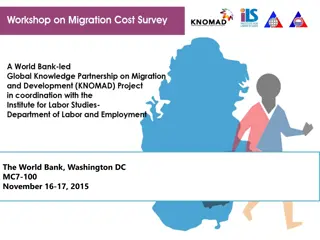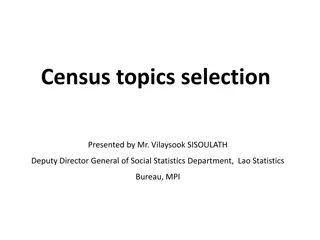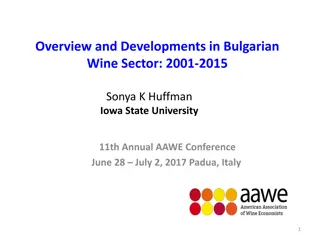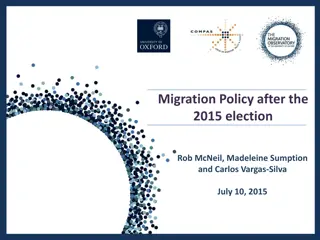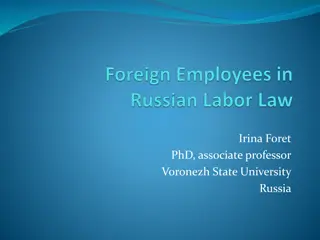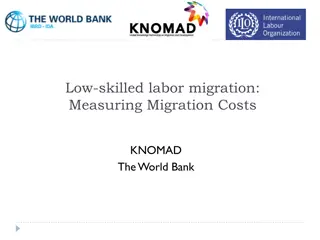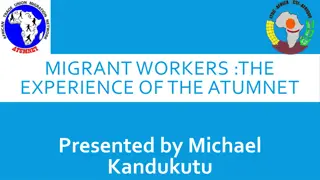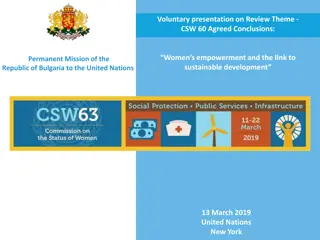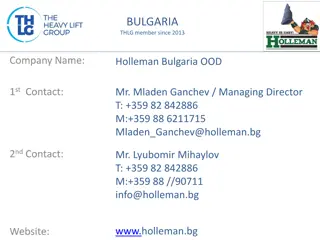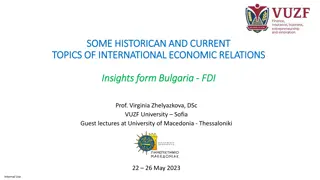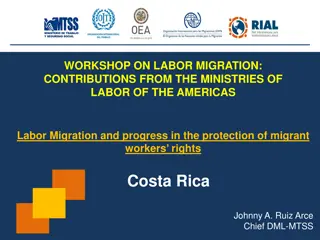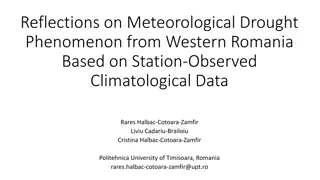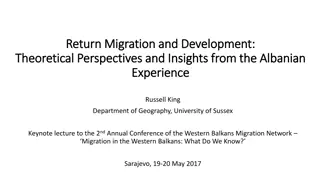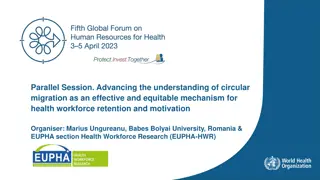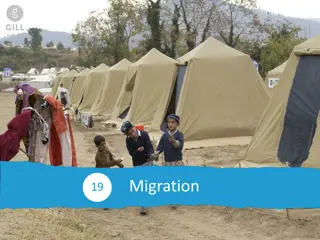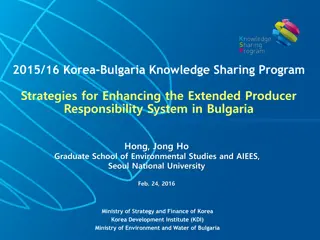Study on Return Migration and Labor Market Outcomes in Romania and Bulgaria
This study examines the impact of return migration on the labor market outcomes of Bulgarian and Romanian migrants, exploring factors influencing their decisions to return, such as labor market structure, monetary incentives, and family motives. The literature review indicates varying skill distributions among returnees, with implications for employment status and skill upgrading. The profile of returnees reveals demographic trends and experiences abroad affecting their reintegration into the labor market.
Download Presentation

Please find below an Image/Link to download the presentation.
The content on the website is provided AS IS for your information and personal use only. It may not be sold, licensed, or shared on other websites without obtaining consent from the author.If you encounter any issues during the download, it is possible that the publisher has removed the file from their server.
You are allowed to download the files provided on this website for personal or commercial use, subject to the condition that they are used lawfully. All files are the property of their respective owners.
The content on the website is provided AS IS for your information and personal use only. It may not be sold, licensed, or shared on other websites without obtaining consent from the author.
E N D
Presentation Transcript
Return migration and the labour market outcomes: case study of Romania and Bulgaria Isilda Mara Vienna Institute for International Economic Studies Study hosted by European Centre for Social Welfare Policy and Research and commissioned by BMWFJ
Outline Motivation and objectives Literature Descriptive statistics Methodology Estimation results Main findings Conclusions and policy implications
Motivation and objectives The decision of migrants to return is mainly determined by labour market structure, monetary incentives, migration targets , dissatisfaction with the outcomes, family motives, cultural affinities, etc. The purpose of this study is to analyse: temporary migration and its effects on the labour market outcomes of the return migrants the migration patterns of Bulgarian and Romanian Returnees whether there is an upgrade in terms of employment and occupational status of returnees and what is the effect of the main determinants
Literature The literature shows that return migrants are selected from both tails of the migrants skills distribution who are heterogeneous in their motives to return, their behaviour, characteristics and their expected outcomes upon return, Stark (1998). There is a negative selectivity among the returnees who tend to be less productive than those who remain abroad. Borjas (1996) Venturini (2008) finds that there is a positive selectivity among the highly-skilled migrants, which are more likely to leave the host country and return home. Dustmann (2003) argues that the wage differential only partly explains the dynamics of migration. Constant and Massey (2002) show that emigrants have higher probabilities to return if they have weak employment ties with the labour market in the host country.
Literature Lacuasta (2006) and Rainhold and Thom (2008) show that, abroad working experience longer than 3 years results in skill-upgrading which is associated with wage premiums upon return. Iara (2006) also finds that the work experience in Western European countries of immigrants from Central Eastern European Counties produces skill diffusion and a wage premium upon return for the work abroad. de Coulon and Piracha (2005) find that although the Albanian return migrants are negatively selected, the permanence and the work experience gained abroad turn out to provide an income premium especially if the returnees choose to work as self-employed.
Profile of Romanian and Bulgarian Returnees Bulgarian Returnees Romanian Returnees Return permanent Gender Age Marital Status Education New language acquisition skills acquired at job Enhance education Home network Abroad Network Negative labour market experience abroad Negative experience because of illegal status abroad 29% 44% 67% 36 years 68% married 11 years 53% 49% 2% 49% 22% 10% 8% 59% males 35 years 52% married 12-13 years 42 % 26 % 3% 39% 50% 14% 10% Duration abroad 32,5 months 91% 22 months 87% Employment upgrade upon return Occupational upgrade upon return Start own business upon return Prior migration income(monthly) Earnings abroad(monthly) Remittances (monthly) Post migration income(monthly) 80% 6% 207 $ 1226$ 76,341 $ 300 $ 81% 10% 104$ 800$ 154$ 170$ Source: World Bank (2005)
Methodology: Maximum likelihood estimation using endogenous switching ordered probit models Following Miranda and Rabe-Hesketh (2006) outcome equation: = + + * i ' i L x * P i i Labour market outcome Li upon return is categorical and ordered taking: L L L 1 2 3 value 1 if the employment and occupational status of the returnee have been upgraded compared to the status prior to migration value 2 if the post-return status hasn t changed from the prior one value 3 if there has been a downgrading in post-return employment status (i.e. inferior to the prior one) Employment upgrading is the switch from non-participation to the status of employee or self- employed; the switch from employee to self-employed. Occupational upgrading is the switch in occupational status categorized in 15 levels. is a vector of parameters to be estimated with dimension B 1 is the coefficient linked with the endogenous switching equation and is the stochastic error term.
Methodology The choice of return migration is a latent endogenous dummy variable given as: = z + * ' i P i i iP * iP >0 = 1 if 0 otherwise In the switching equation above: Pi= 1 if the return migrant has intentions to stay home permanently Pi= 0 if the individual has intentions to re-migrate is a N 1 vector of parameters to be estimated is the stochastic error term.
Methodology The main assumption is that the residuals are bivariate and normally distributed and specified as: * = + = + i i i i i i The system of equations as is given as below: = = + + + * i ' i L x * i i ' i + * P z i i i Where i , i , iare normally distributed while is a free parameter called factor loading The explanatory variables in the deterministic part X are the permanent intention to return home, the wage premium upon return, education or the acquisition of new skills abroad, duration of stay abroad, age, the share of remittances and the intentions to start own business activity. The explanatory variables included in the deterministic part of the permanent return equation are: age, education, the connection with networks at home and abroad, household members intentions to migrate, negative labour experience abroad, and negative experience related to an illegal status while abroad.
Methodology As in Miranda and Rabe-Hesketh (2006), the combination variable is linked through and the link function is restricted to be a probit for the switching equation and an ordered probit for the outcome equation. V ij ji E(V / ) ij i ji = = + + ) d + ' i + ' i g ( ) d ( x * P * ( z ) 1 2 ji j ji ji i i ji i
Estimation results Romanian returnees 1.095*** (0.251) 0.005** (0.002) -0.028*** (0.003) -0.173* (0.081) -0.010 (0.015) -0.004 (0.003) 0.000 (0.000) 0.000* (0.000) Employment upgrading Bulgarian returnees 0.758** (0.231) 0.001*** (0.000) -0.009** (0.003) 0.180* (0.079) -0.008 (0.011) -0.008** (0.003) 0.000** (0.000) 0.000* (0.000) Occupational upgrading Bulgarian returnees Returnees 0.628** 0,874* (0.203) (0,322) 0.000 -0,000 (0.000) (0,002) 0.004 -0,021*** (0.003) (0,004) 0.242** 0,068 (0.078) (0,081) -0.021 0,024 (0.010) (0,016) -0.008*** -0,005 (0.002) (0,003) 0.000** 0,000 (0.000) (0,000) -0.000 -0,000 (0.000) (0,000) Romanian Permanent return Permanent return Wage Premium Wage Premium Age Age Job skills acquisition Job skills acquisition Education Education Duration abroad Duration abroad Duration abroad squared Duration abroad squared Av. remittances Education Av. remittances Switching equation (endogenous dummy=permanent return) Switching equation (endogenous dummy=permanent return) Age Age -0.06 (0.026)* 0.001* (0.000) 0.18* (0.102) 0.042** (0.013) 0.412** (0.146) 0.262* (0.142) -1.018*** (0.116) 0.305** (0.113) 0.397** (0.135) -0.291 (0.494) -0.442* (0.187) 0.933*** (0.183) 1199 -1842 0,030 (0,022) -0,000 (0,000) 0,195* (0,083) 0,0362** (0,012) 0,0153 (0,086) 0,116 (0,102) -0,59*** (0,105) -0,231 (0,125) 0,287* (0,138) -1,495** (0,439) -0,445* (0,173) 0,628** (0,179) 1199 -2002,5 -0.074** (0.026) 0.001** (0.000) 0.187* (0.102) 0.041** (0.013) 0.393** (0.145) 0.254* (0.142) -1.011*** (0.116 0.266* (0.117) 0.359** (0.137) -0.0128 (0.500) -0.988 (0.199)*** 0.747*** (0.187) 1199 -1739.14 0.030 (0.022) 0.000 (0.000) 0.139* (0.086) 0.036** (0.012) -0.002 (0.085) 0.118 (0.102) -0.647*** (0.096) -0.182 (0.124) 0.191 (0.138) -1.447** (0.444) -1.066*** (0.18) 0.421** (0.176) 1199 -1902 Age squared Age squared Start own business Start own business Education Education Network home Network home Network abroad Network abroad Household Member abroad Household Member abroad Negative labour market experience abroad Negative labour market experience abroad Complications due to illegal status Complications due to illegal status Cons Cons _cut1 _cut1 _cut2 _cut2 Nr. observations Log likelihood Nr. observations Log likelihood Standard errors are reported in the parenthesis and * stands for p<.05, ** for p<.01, and *** for p<.001
Main findings: Bulgarian returnees Labour market upgrading among Bulgarian returnees using as indicator the employment status: Is positively related with the intention of a permanent return. Wage premiums upon return and acquisition of new job skills during the work experience abroad The average amount of remittances sent home has a low but positive effect, Migration duration abroad is U-shaped The intentions of returning home permanently are : positively effected by the intentions of starting a private business the support of the network at home Having a negative experience in the host country labour market and the uncertainty of illegal status push the migrants to permanently return home. The intentions of household members to settle abroad determine the intentions of returning home permanently in a strongly negative way. The enhancement of education positively affects a permanent return home but the effect on upgrading is not significant. Occupational upgrading similar to employment upgrading is: positively affected by the skills accumulated abroad, the intention to return permanently and longer migration durations, but in terms of wage premiums the effect is insignificant.
Main findings Romanian returnees The labour market upgrading among Romanian returnees: Has a positive relationship with the intentions of a permanent return and the wage premium. Among women, the upgrade in employment is positively related to the duration of stay abroad whereas among men, the duration of stay has no impact on upgrading. Male returnees have a wage premium upon return that rewards their upgrade in the labour market, which is not confirmed for women. The permanent return of men is positively determined by the intention of starting an own business, by education. Differently from Bulgarian returnees, the networks at home and abroad appear to be insignificant. With reference to occupational upgrading, there is no confirmation of a wage premium and duration of stay abroad shows no significant effect. There is a negative relationship between the intention to return permanently at home and the main destination countries Hungary, Italy and Spain, while for Germany the effect is positive but insignificant. The results confirm the circulatory and seasonal migratory patterns of Romanian migrants toward countries, which have closer linguistic and socio-cultural affinities such as Hungary, Italy and Spain.
Conclusions Upgrading in the local labour market strongly depends on: skill composition of the return migrant type of selectivity monetary incentives (wage premium ) intentions to return permanently. The permanent intentions of return are determined by: the work and legal experience abroad Education enhancement and intentions upon return household members intentions toward migration The support of networks The interdependence in the decision-making process about return migration and labour market outcome require counting them simultaneously.
Policy implications Short migration durations and permanent returns because of negative labour market experiences or the illegal status abroad, prevent immigrants to acquire sufficient skills, knowledge and work experience that could be transferred at home upon return. Premature returns would be harmful toward investments in human and social capital of immigrants. From the perspective of home labour markets there may be several reasons for which return migrants might not fare in the expected way. In order to take best advantage of their human capital, home and host countries must adopt: policies to ease the entry of return migrants to the labour market introduce measures that promote the accumulated skills motivate the returnees by improving remuneration and occupational choice.
